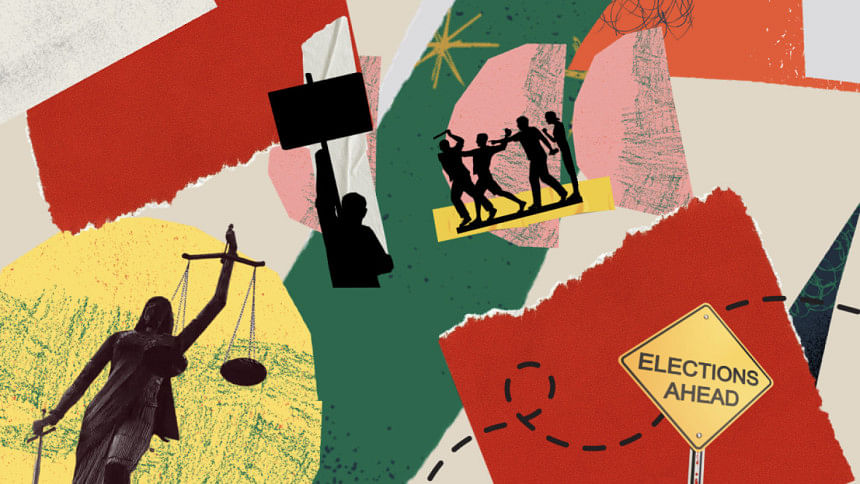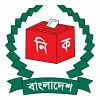After July: A fragile transition, a nation in waiting

One of the most significant political upheavals in Bangladesh's recent history occurred during the July uprising, which took place only a year ago. After years of political persecution, suffocation, and the deliberate deterioration of democratic principles, it was a moment of communal liberation for many. Former Prime Minister Sheikh Hasina's prolonged and increasingly autocratic administration came to an abrupt end due to a confluence of student protests, widespread public discontent, elite disenchantment, and institutional retreat. Hope for change, rebirth, and the restoration of the republic followed. That hope remains a year later, albeit weakened.
The subsequent transition following the uprising brought with it an interim government, headed by Prof Muhammad Yunus, which was never going to be easy. The government began cautiously optimistic, charged with re-establishing public trust, consolidating a shattered state, and laying the groundwork for a fair electoral process. It pledged a restoration of the rule of law, reform, and inclusivity. However, the administration is increasingly vulnerable to both internal conflicts and public scepticism due to its delayed delivery, increasing political inconsistencies, and growing doubts about its authority.
The breakdown of the political unity that initially enabled the revolt has been the most depressing development since it began. After briefly uniting behind a common goal—the overthrow of the previous government—the alliance of student activists, opposition parties, and civil society leaders has returned to distrust, competitiveness, and conflicting agendas. Long seen as the main opposition party, the BNP has struggled to articulate a consistent post-Hasina policy, wavering between calls for more extensive structural reform and demands for early elections. The National Citizen Party (NCP), which formerly presented itself with a young, reformist image, has become increasingly entangled in internal conflicts and characterised by exaggerated rhetoric. Even some student organisations, which were previously praised as the movement's moral core, have been drawn into disputes and controversies.
The Awami League's political future is still a significant concern in the interim. Whether it should be officially banned or marginalised remains a topic of debate. Although many people believe that a party long associated with authoritarianism and impunity must be held accountable, others caution that exclusion—particularly by decree—risks eroding the same democratic norms that the movement aimed to restore. Here, there are no simple solutions. There is a fine line between justice and retaliation, and in a culture still dealing with the effects of political violence, moving forward requires a level of self-control that is hard to muster.
The position is made more difficult by the strategic hesitations of the interim government. It has hinted at election dates, with February 2026 being the latest, but has yet to release a definitive schedule or legal framework. (On July 31, the law adviser said the election date would be announced in a few days.) Both supporters and opponents have criticised the interim for its incapacity or refusal to take decisive action on issues such as judicial independence, bureaucratic accountability, and law enforcement reform. Merely symbolising is no longer sufficient in an environment where public vigilantism, mob violence, and administrative indifference are becoming more apparent.
International players have also been keeping a careful eye on things. Once a major backer of the former Awami League-led government, India has been, at best, ambivalent towards the new administration due to its unclear stance and cautious diplomatic approach. Border disputes have escalated, especially in light of recent push-ins of Rohingya refugees and Muslims who speak Bangla. China and Pakistan, however, have taken a more realistic stance and are offering cautious engagement. While applauding the end of autocratic leadership, Western nations have begun to voice concerns about the absence of human rights protections and the lack of election certainty. The interim government continues to face a challenging balancing act between local consolidation and international credibility.
Nevertheless, something has changed amid all this uncertainty. The prevailing power's myth of invincibility has been dispelled. The fear-based culture that stifled dissent has been broken. A new generation has taken the stage, one that is politicised by engagement rather than inheritance. This is no small accomplishment in and of itself. However, this is not enough to sustain a movement. They need organisation, creativity, and most importantly a forward-looking vision.
The next few months will be pivotal. The gap will either be filled by opportunism, resentment, and a return to authoritarianism, or the interim government will be able to steer the country towards elections and reform in a legitimate manner. For a country that has repeatedly paid the price of freedom, it is reasonable to expect its leaders to step up when the time comes.
Zillur Rahman is a journalist and the host of the current affairs talk show 'Tritiyo Matra.' He also serves as the president of the Centre for Governance Studies (CGS). His X handle is @zillur.
Views expressed in this article are the author's own.
Follow The Daily Star Opinion on Facebook for the latest opinions, commentaries and analyses by experts and professionals. To contribute your article or letter to The Daily Star Opinion, see our guidelines for submission.

 For all latest news, follow The Daily Star's Google News channel.
For all latest news, follow The Daily Star's Google News channel. 









Comments